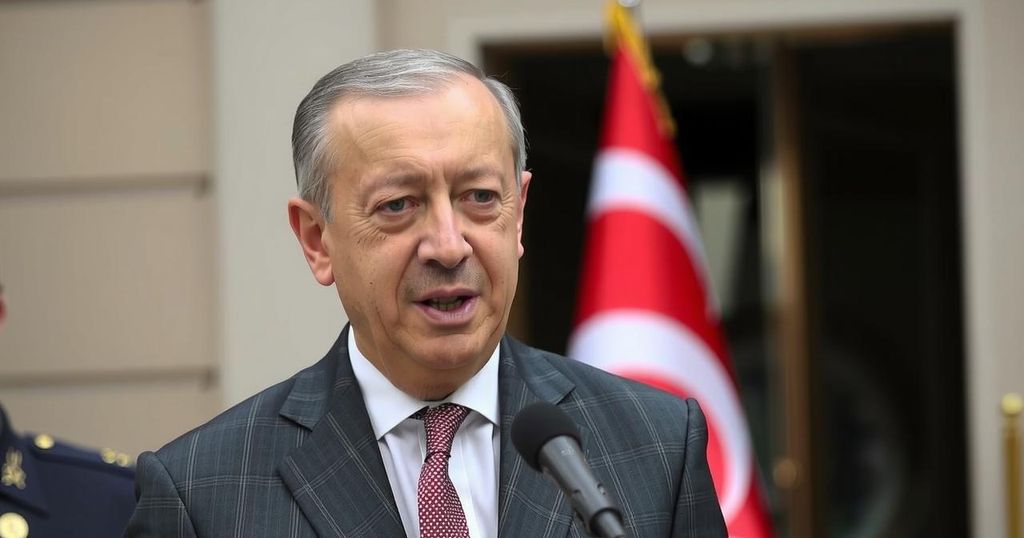Global news
ASIA, BASHAR AL - ASSAD, CONFLICT, ERDOGAN, EUROPE/ASIA, FIGHTER JETS, FREE SYRIAN ARMY, IBRAHIM KALIN, KALIN, ME, MEE, MIDDLE EAST, MILITARY OPERATIONS, NORTH AMERICA, PALESTINE, REFUGEE CRISIS, SISI, SYRIA, SYRIAN CONFLICT, SYRIAN NATIONAL ARMY, TA, TAHRIR AL - SHAM, TURKEY, UNITED STATES, US
Fatima Khan
0 Comments
Erdogan’s Visit to Cairo: A Strategic Dialogue on Syria’s Future
President Erdogan’s impending visit to Cairo intends to facilitate discussions with President el-Sisi regarding the current situation in Syria, particularly following the Assad government’s fall. This visit, occurring during the D-8 summit in December, seeks to strengthen Turkey-Egypt relations and address regional stability concerns, focusing on potential reconstruction efforts in Syria.
President Recep Tayyip Erdogan of Turkey is scheduled to visit Cairo to engage in discussions with Egyptian President Abdel Fattah el-Sisi, with a significant focus on the evolving situation in Syria. The meeting is particularly timely as Egypt seeks to enhance its diplomatic relations with Ankara to address concerns surrounding Syria’s newly established government following the conflict that led to the ousting of President Bashar al-Assad. Erdogan’s visit coincides with the D-8 summit taking place in Cairo on December 19, 2023.
In recent developments, Erdogan has expanded Turkey’s regional influence with the Syrian rebels allied with Turkey, particularly following the Assad government’s downfall. Erdogan’s longstanding support for Syrian opposition groups has positioned Turkey as a central player in Syrian affairs. Concurrently, Turkey’s National Intelligence Organization (MIT) chief, Ibrahim Kalin, recently visited Damascus, indicating Turkey’s strategic engagements in Syria.
Syria’s transition under the new governance has elicited apprehensions among Arab states, including Egypt, Jordan, and the Gulf countries, all wary of the dominance of HTS, a group previously linked to al-Qaeda. Egypt’s willingness to engage in dialogue with Erdogan signifies a potential thaw in relations, as both countries aim to navigate the political instability in Syria efficiently.
Moreover, the upcoming summit will present an opportunity for regional leaders to address pressing concerns, with Iranian President Masoud Pezeshkian also in attendance. This meeting aims not only to bolster diplomatic ties among Turkey, Egypt, and Iran but also to pave the way for collaborative discussions on reconstruction efforts in Syria, which could reach an estimated $400 billion.
The interaction between Erdogan and Sisi will serve as a litmus test for the capacity of Arab states to set aside historical rivalries and collectively manage the transitional period in Syria, a nation marred by turmoil for over a decade. With Turkey advocating for the safe return of Syrian refugees, this meeting holds significant implications for regional stability and reconstruction.
The current diplomatic dynamic in the Middle East, particularly in relation to Egypt and Turkey, has evolved significantly since the Arab Spring. Following the ousting of Bashar al-Assad and the subsequent rise of HTS, Egypt has sought to reestablish relations with Ankara to manage the fallout from Syria’s power vacuum. Historical tensions, primarily stemming from Egypt’s alignment against the Muslim Brotherhood and Turkey’s support for it, provide a backdrop to their impending discussions. The recent changes in Syria have prompted various stakeholders, including Iran and Gulf States, to reassess their positions in light of the regional shifts prompted by the Assad regime’s collapse, marking a new era of cautious diplomacy. Erdogan has traditionally been aligned with Syrian rebels, and Turkey’s strategic involvement in Syrian affairs is vital for regional stability. Moreover, the military and political affiliations of various groups within Syria complicate the situation, necessitating a nuanced approach during Erdogan’s talks with Sisi.
The forthcoming meeting between Presidents Erdogan and Sisi signifies a pivotal moment in regional diplomacy, focused on Syria’s transformation following the Assad government’s demise. The discussions will encompass not only immediate political concerns but also broader issues of stability, security, and reconstruction efforts. Both leaders appear poised to address longstanding grievances and create pathways for cooperation that could redefine Turkey-Egypt relations in the volatile Middle Eastern context. This diplomatic engagement could ultimately influence the collective response of Arab states toward the ongoing crisis in Syria.
Original Source: www.middleeasteye.net




Post Comment